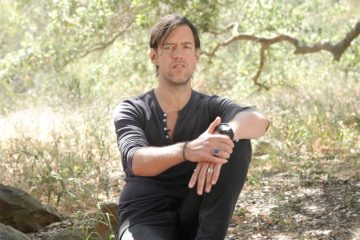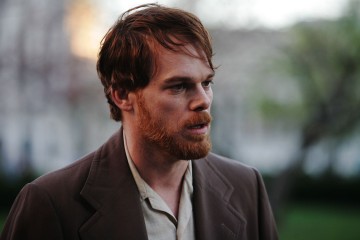Christoph de Babalone
Site officiel : http://christophdebabalon.com/
DJ et producteur allemand, Christoph de Babalone a assuré quelques premières parties du groupe en 2001, à l’invitation de Thom Yorke, mais à la surprise générale des fans. La passion de Thom Yorke pour le DJing était alors moins revendiquée, et forcément, les mix de CdeBabalone surprenaient.
[quote ]“Ce gentil garçon qui s’appelle Christoph et que je n’ai encore
jamais rencontré écrit de la musique pour les gens qui, comme moi,
espèrent, dans les trente ou quarante années à venir, vivre dans une
bulle étanche sur une planète lointaine, d’où nous observerons la lente
extinction de la Terre. J’écouterai ses disques tout en feuilletant de
vieux journaux, sombrant dans la nostalgie des mauvaises émissions de
télé, des embouteillages et des vapeurs de diesel.”
Thom Yorke (source)[/quote]
Un article du New Yorker décrit un peu l’ambiance de l’époque :
On a hot day in May, the city
of Bilbao was shaken by a velvety roar, not unlike the sound of a jet
plane waiting on a tarmac. At one end of Calle de Iparraguirre, which
cuts across the town, the silver shell of the Guggenheim Museum was
glistening in the sun. For a moment, it seemed as if the noise were
coming from there—as if the building were about to lift off and rocket
elsewhere. In fact, the source of the disturbance was a local bullring,
the Vista Alegre, where a German experimental d.j. named Christoph de
Babalon was testing his gear. He was the opening act for Radiohead, a
five-man rock band from Oxford, England. Radiohead fans were gathered at
the entrance, staring up at the sound and asking what it meant. One had
on a Kafka T-shirt, and others wore shirts with a Radiohead logo, which
can only be described as a demon in tears.
A side door led to a
concrete corridor, where the bulls run on an ordinary day. From there,
planks reached out to a temporary stage. Christoph was in the center,
eying his mixer and his CD players. With ice-blond hair and black
sunglasses, he looked like a young Bond villain, but he turned out to be
a friendly, chatty sort of sonic terrorist. “I am familiar with dark,
small clubs,†he said after the sound check. “Now it is like I am in a
gladiator film.†He mentioned some of his musical influences, which
included avant-garde figures like Merzbow and the composer Morton
Feldman. “Sometimes I work with beats, sometimes with layers,†he said.
“Tonight I do layers.â€
Popular music in the year 2001 is in a
state of suspense. No one can say where the mystery train is going. On
the one hand, the Top Forty chart is overrun with dancers, models,
actors, and the like ; on the other hand, there are signs that pop music
is once again becoming a safe place for creative musicians. The world
fame of Radiohead is a case in point. Having established themselves with
tuneful guitar rock in the nineties, the members of this band took the
risk of doing as they liked, and they discovered things about the
marketplace which others had missed. Last year, they released an album
titled “Kid A,†an eerily comforting blend of rock riffs, jazz chords,
classical textures, and electronic noise, which, in a demolition of
conventional wisdom, went to No. 1 on the Billboard chart. “Amnesiac,â€
its like-minded successor, came out in June and is doing just as well.
Radiohead’s selling point is not their identification with any one genre
but their way of ranging over music as a whole. They have intensity,
intelligence, a personality in sound. In Bilbao, they were present in
spirit before they played. The idea of placing a German d.j. in a
Spanish bullring was Radiohead to the core—a tricky, eclectic song
waiting to happen.
Christoph
went to his dressing room, and the stage was empty for a while. Two
shirtless old men sat on stone steps, looking as though they had not
moved since Franco died. Radiohead’s gear basked in the sun. On the
left-hand side was a rack of guitars—twenty-three in all. Up front, in
an area set aside for Ed O’Brien, one of three guitarists in the band,
was a tangle of pedals, samplers, and inch-thick cords. In the center of
the stage, to be shared by Colin Greenwood, the bass player, and Thom
Yorke, the singer, were various keyboards, a piano, and an upright bass.
Equipment for Colin’s younger brother, Jonny Greenwood, stood on the
right : more guitars, more keyboards, a xylophone, a transistor radio, a
sci-fi stack of analog synthesizers, and a modified ondes martenot, one
of the earliest electronic instruments. The ondes martenot is controlled
by a ring that slides along a wire ; fewer than a hundred people have
mastered it, and Jonny is one. The only really conventional-looking
apparatus was the drum set, although you could tell by some distress on
the edges of the drums that the player, Phil Selway, had attacked the
sides as well as the skins.
Backstage, the members of Radiohead
were eating dinner. Colin Greenwood hovered over the catering table,
inspecting an array of Basque dishes. He is typical of the group in that
he looks nothing like a celebrity who has sold fifteen million records.
He is thirty-two years old, with jet-black hair and large, kindly eyes.
He is easily distracted and delighted by the world around him, favoring
the words “mad,†“brilliant,†and “amazingâ€â€”the last spoken with a
long, liquid stress on the second syllable. He has a habit of suddenly
burying his face in his hands, as if he were sinking into despair, or
falling asleep ; after a moment, his face lights up again. Lavishly
well-read, he can talk at length about almost any topic under the
sun—Belgian fashion ; the stories of John Cheever ; the effect of
different types of charcoal on barbecued meat—but he gets embarrassed by
his erudition and cuts himself off by saying, “I’m rambling.†He is not
above wearing a T-shirt that says “Life’s a beach and then you shag.â€
You might peg him as a cultish young neo-Marxist professor, or as the
editor of a hip quarterly. But he is a rock star, with several Web pages
devoted to him.
“It’s full on out there, isn’t it ?†Greenwood
said, looking toward the bullring, which was filling up with fans. “I’m
scared.†He occupied himself by talking about “Faust’s Metropolis,â€
Alexandra Richie’s thousand-page history of Berlin. Outside, Christoph
began to play for real, and was received in bemused silence.[/quote]
Thom est par la site resté lié à C. de Babalon, puisqu’en 2010, alors qu’il avait préparé un mix pour une émission de la BBC, on apprenait qu’il avait reçu un morçeau du DJ.
http://www.radiohead.fr/Ici-Londres


No Comment